No matter your size of family (single or married with 10 children) you likely have a budget. From the wealthiest to the poorest person I know they all have some form of one. If you don’t have a budget, you ought to.
That budget should include food too. (Duh.) We all know this, but one of the questions I most often receive on my blog is “How do you feed a family real-whole food on a budget?”
That is a loaded question to be sure. We really need to start with the basics of how food budgets work and how best to make one for your unique situation. One thing we tend to do too often is compare. Your family’s needs, lifestyle, people, and income are likely most certainly different than mine.
Budget Comparison (i.e. who can eat best for less)
Comparison in budgeting desperately needs to stop. I am serious about this. It can be detrimental to your family’s health and peace.
Can we learn from one another? Yes. Should we learn from one another? Certainly. But we must stop comparing, and we must endeavor to do the best we can with what we have.
Budget comparison is akin to the emotional impact we get from social media. Social media only offers a glimpse into someone’s life, oftentimes leaving out struggle, strive and difficult real-life situations that happen to everyone. At the core, budget comparison is no different.
What you see others purchasing is only a small part of the whole story. We have no idea what the rest of the budget looks like, what debt someone might have, financial obligations, or the amount of work that went into earning that income. We only see a glimpse of the whole story.
Instead of falling for the comparison trap, focus on how you can do more with what you have to give your family the best possible options now. Striving to improve your budget is always a great aspiration to have, but making the most of what you already have is also important.
Learn more about budgeting for grocery shopping here!
That said. We need to move forward and check out a few options for real-whole food budgeting as we build a framework for what will work best within our unique situations and stations in life. Let’s begin 🙂
Important Questions Before You Begin
Ask yourself these questions:
- Do you pray before you budget?
- Do you pray before you shop?
- What do you think of when you talk of real-whole foods?
- What is a mainstay in your home?
- What are your financial obligations?
When and Why to Pray?
Praying? Yes, yes, yes! It is so important to take everything to the Lord. We cannot have His wisdom if we first do not seek His wisdom. So yes, pray. Pray before you budget, while you’re figuring out your budget, and after you settle on a budget—ask the Holy Spirit speak to you if you are off on anything.
Pray before you go out to shop online or in a store, while you are shopping, and then especially before you check out. Ask the Lord if there is anything that you really don’t need right now. Should you return something before you check out? Something you picked up that you really don’t need?
These things matter. They keep your heart and mind in the right place to receive the full blessing of God in your body!
You won’t be sorry you prayed. And be sure you’re not rushing the process.
There are times I have been heading to the check out line and the Lord told me (not an audible voice but a gentle knowing in my spirit) to put somethings back. At first I was tempted to purchase those goods anyways and even reasoned why buying the items was a good idea. But the more I reasoned the more I knew I was wrong.
Returning the items gave me such peace and joy knowing that the Lord will provide what we need when we need it and a solid blessing of just knowing that I was doing the right thing. That this act would keep me in a place of blessing to honor our budget overwhelms me immediately.
What are Real-Whole Foods?
This is pretty simple. Honestly, this is a lot simpler then the health world has made things. Real-whole foods are foods as close to their natural state as possible and as free from man’s handling as possible. Do you want to know more? Check out “A Skeptics Guide to Whole Foods” and “What’s Really the Difference? Processed vs. Whole Foods.”
That doesn’t mean things won’t have been altered to some degree. We don’t eat the shell of the almond, that would be nasty. We remove the shell and that blesses our bodies. Likewise with some grains and other nuts.
What I am talking about is keeping things whole and real.
For me that does include grains. I know that a lot of folks (including myself for a time) have been or are currently grain-free. That doesn’t mean that grains are not whole foods or real foods. It’s about the processing and true bio-availability of the nutrients that matter when consuming grains.
While it may be difficult to deny that processed food is made to be delicious, it’s also a problem that affects how we view and taste whole foods.
When our diets are full of unhealthy, over-processed foods, our tastes change to reflect that. If given a choice based solely on flavor, most people would obviously choose pizza over roasted cauliflower. While we all know that the cauliflower offers more nutritional value, the taste is oftentimes put at the forefront of meal planning for families.
On my own health journey, I’ve discovered that these tasty, processed foods are deceiving. They train our taste buds to expect the over-the-top flavor that added salts, fats and carbs bring us while overpowering the good, natural taste that whole foods offer. When we cut out the processed foods, it gives our minds to discover that healthy, whole foods are just as delicious. By switching to eating a whole-food-based diet, we are re-training our tastes on what to expect.
Whole foods are delicious, but their taste and flavor simply become overpowered by the flavor that processed foods possess. While mealtime should absolutely be an enjoyable experience, we must remember that food is fuel for our bodies, and making the choice to consume the best options should be the focus.
Let’s get to a list for you too see what I consider to be whole foods…
Real-Whole Foods:
- meat
- fish
- poultry
- game
- eggs
- fermented dairy/raw dairy
- vegetables
- fruits
- grains
- nuts/seeds
- low processed/unrefined fats
This list is really basic and so are real-whole foods. Simple and pretty straight forward. These are foods that have been around providing the world for centuries with nourishment and goodness.
Determine Mainstay Foods
This needs to be determined by you and you alone. If you are married, you most definitely need to come to some kind of consensus on what you believe to be mainstays as a couple.
For us, a staple, or mainstay is grass-fed beef. You can read my article here on what we do to keep our costs down to a minimum and how valuable this choice has been in our family. In a nutshell, we feel buying the best possible beef will bless our bodies most.
We do buy chicken and fish. We do some vegetarian meals through out the week to make our meat last and ease the budget. It’s totally worth it.
Reducing the amount of meat consumed at mealtimes has several advantages. Besides reducing the overall amount of money spent on meat, vegetarian meals offer health benefits, help create meal variety, and expose our families to introduce us to foods we might not otherwise consider.
When planning vegetarian meals, it’s important to remember to substitute the protein and nutrients in meat that we rely on. Eggs, beans, vegetables, and nuts are all great sources of protein and searching for recipes that utilize these ingredients can help our meal planning from becoming stagnant.
We buy fruits and vegetables in fresh and frozen states. I often can my veggies when produce is at it’s peak in the summer because it is cost effective and much healthier than store-bought canned foods. They taste way better too. We do not buy canned veggies from the store.
We buy our grains in bulk online or through local co-ops and natural food grocers.
A good way of adding leverage to these items is to take a look at how you are purchasing them. When we purchase these consistently-used-items in bulk, we not only reduce the amount of shopping needed on a weekly basis but can also lower the total cost that we’re paying for these items.
Buy produce on sale in bulk and freeze or can these to really extend the value of the purchase. While unplanned purchases generally add stress to a budget, making a bulk purchase of mainstay items on sale could be beneficial. Freezing or canning mainstay produce and meat can really extend the value of your budget. In this instance, a larger upfront purchase equates to money saved over time.
I only recommend making these types of purchases if your overall budget can sustain it. If you must forgo paying a bill, or remove needed food items from your list to make this purchase, it is no longer a wise investment.
What are “cheats” that we allow in our house:
- processed nut milks (for me when I don’t want to make my own)
- rice noodles
- pasteurized milk and soda (for my husband)
- pasteurized juice (for my husband)
- cereal (for my husband)
- white bread (for my husband)
- potato chips (for my husband)
I see a theme here. 🙂 I believe in letting my man be himself. He chooses to eat the way he wants. He allows me to cook healthy meals and make from scratch just about everything but there are certain things he wants and he can have. It is a shame to see marriages come under attack because of food.
But as you can see, these are really the only exceptions we make on a regular basis for food. These would be the weekly purchases that my man wants me to make for him no matter what. This blesses him. Occasionally we have something like hot dogs, but we buy the nitrate/nitrite free, whole beef brands.
You may think we are less then stellar, and truthfully we are compared to many people I know. But this is what we have come to have our convictions on and it keeps our family happy and healthy and our budget blessed too.
Financial Obligations
We live in a real world with real obligations. It may be that you are living off of a dual-income or you may be living off of a single income. No matter what type of budget you have, you need to work with it and rule it well.
We are a single income family. We have had the conviction for years that it was a call on our lives to live the way we do. It has still been difficult to stand strong at times, yet we do and the Lord has blessed us.
It is our firm belief that we (and you) meet what obligations we have, those that we have by choice or force. It is a testimony to the world and honors God when we do. So if you have to cut back on real-whole foods, or that’s what you think you need to do, then do it.
But first let me give you some options that may bless you in the long run. We actually eat real-whole foods because it is cheaper. I know, my hubby doesn’t all the time, but my kids and I do. Our budget is only kept as low as it is because we eat this way!
Oh how easy it is to ruin a budget with the wrong mindset. I am a firm believer in creating a shopping list and sticking to it.
Have you ever gone into a store, meals planned and list in hand, only to find yourself at the checkout with a few items not on the list? It’s often easy to justify these unplanned purchases in the grocery store when the items are only a few dollars. The problem with this mindset is two-fold.
Those “small” purchases add up to create an unnecessary dent in your food budget (And overall budget, and the money for unplanned purchases have to come from somewhere else in your budget,) and it creates the foundation of forming a bad habit.
Think of it this way: If you purchased a few extra not-on-the-list items every week that totaled $15, you are spending an additional $780 per year. That is so much money!
Make a list, and be strong in your convictions to stick with it.
Budgeting Tips:
1. Price Per Meal: keeping every meal below a certain price
For instance: Breakfast below $5 per meal, Lunch below $5 per meal and Dinner below $10 per meal. You can go higher or lower. Try it this way, you may be surprised how low you can go.
2. Bulk Purchasing: buying produce, meat, grains, and dairy in bulk will likely decrease you cost in the long run
It has for us. It seems expensive at first. It is the “over time” value that you are getting. If I spend $2 per pound for a bag of dried beans non-organic at the store weekly, I am spending $104.00 per year. But if I purchase a 50 pound bag of beans that costs $1.25 per pound of organic dried beans that equals $62.50 in one shot but over time it saves big. I have my years worth of beans in one purchase but I am saving a lot of money!
3. Co-Op (farm-share) Purchasing
We really enjoyed the variety of vegetables and fruits we received. Like bulk purchasing it is an upfront cost that seems high, but in the long run it actually saved us a lot of money. Why? I averaged the initial cost out to a per week cost and picking up my veggies and fruits from the co-op saved me a lot of money. I could not have purchased that same amount from any store. We froze what we wouldn’t get to. It kept me from spending more at the store when I did go and it also kept our store runs down to a bare minimum.
4. Grow Your Food (huge budget-buster)
After our first year at the co-op, I had the idea that if I can buy this much from them, how much more can I grow for myself for cheaper? I had to learn a lot before I set out to grow, but I did. And yes, growing your own veggies and fruits is by far the cheapest way to go. It does take work.
You may be thinking it takes a lot of land too, but not if you learn the way I did. (I will have to write another article on that.) Suffice it to say, do your research, and you’ll be surprised how much you can grow on very little land, even in the city and even in places where everyone says nothing can grow. If you’re looking for a beginners guide to gardening, you can start with this article here.
5. Remove Some Foods
I am sure we all have something in our fridge, freezer, or pantry that we think we must have that really is not a necessity. I know you may hear it from your kiddos too. I did with mine. Even the children of Israel complained though they were blessed abundantly in the wilderness. Your family may see this as a wilderness, but it’s not.
My point: it’s not ok for us to give in to complaining instead of sticking to our guns and our budget. You lead your family the way the Lord wants you. They don’t lead you.
I have made some big statements, I know, but consider how over-purchasing on real-whole foods or other junky foods can negatively impact your family’s well being.
Not budgeting will end up snowballing in a negative way over a period of time if it continues to be a pattern in our shopping habits. So pray and ask the Lord what you need to buy, what meals to make this week, what stores you should shop at and what foods will most bless your whole family.
If I buy too much of anything or something that is good but not needed, I add stress to myself and my budget. That purchase keeps me from being a blessing to my hard-working husband. It maybe causes me to cook something that no one would be interested in. It might “steal” money from another part of our budget that needs those funds.
I know what it feels to miss the mark here and that is not good. I have seen negative consequences to my health in pursuing purchases and keeping habits that were too expensive and not agreed upon by my husband and me. These can cause more issues then you might be trying to solve. A healthy marriage is far more valuable than a costly side of cow. Be a blessing to your whole family, even generations, by doing the best with what you have and buying the best you can with those funds.

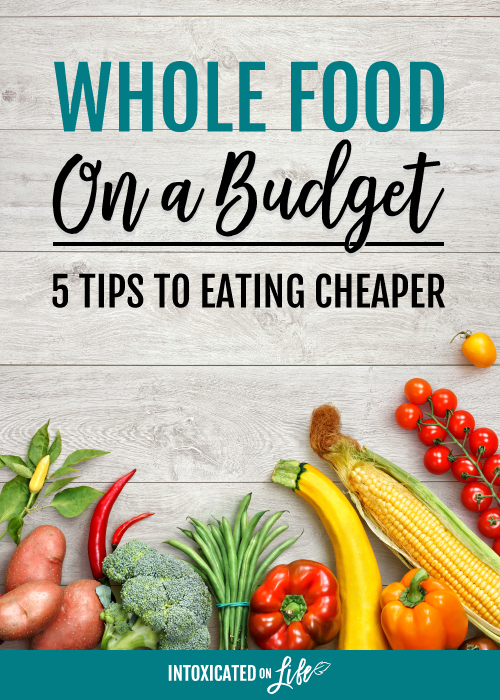
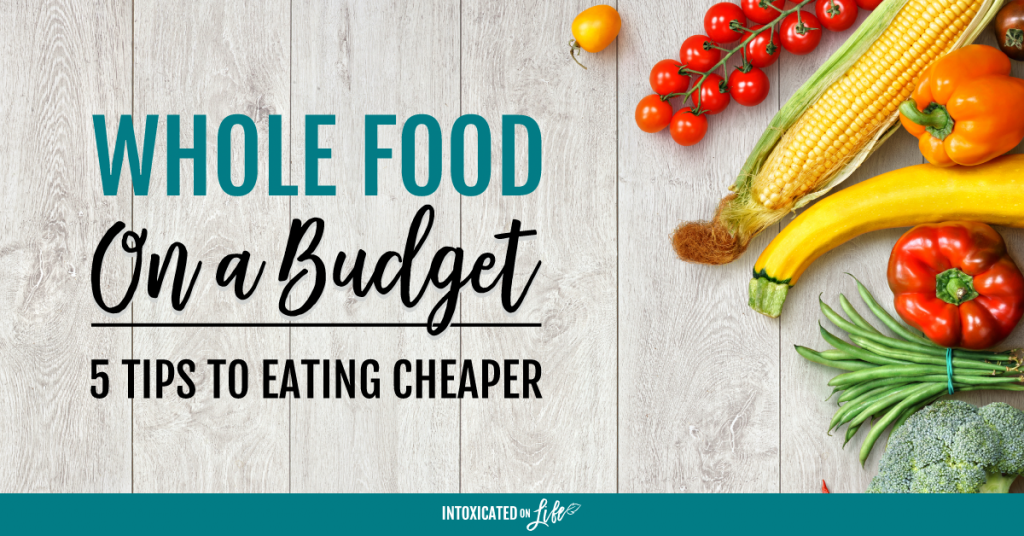
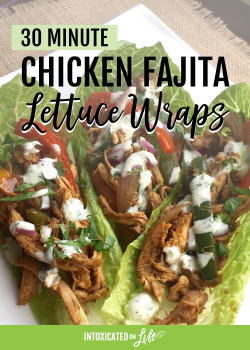
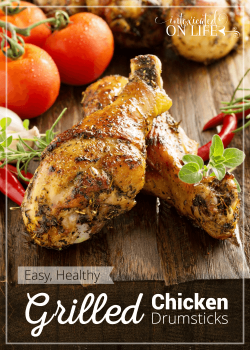

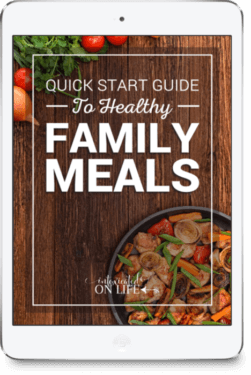

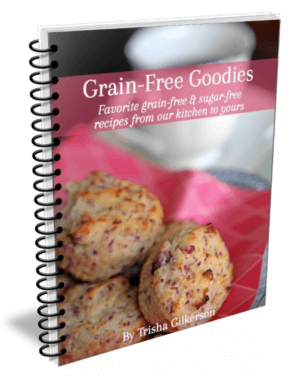
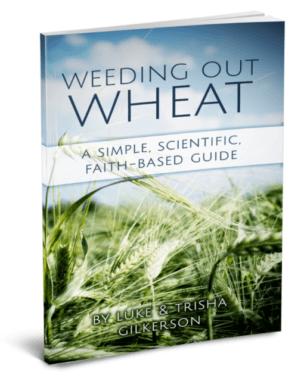


This is a great help! I honestly have not thought about prayer in my grocery shopping I am excited to start!!!
Glad to spark a new thought in you Stasia 🙂
This is great advice! We have been working the past few weeks to get our meal budget down lower and we are doing well. I heartily agree withe the bulk buying principle. It helped me to think of the month as a whole and so I divide up the costs of certain things (like rice) over the whole of the month so that I can get it for cheaper per serving, etc. I also found it helpful to calculate the exact cost of my most common meals so that I know which are the cheapest for me to make and so for right now we are cutting out the ones that are more costly. It takes a little work but it really helped me to zero in on some savings. By making the dinners that are only $6-8 instead of $10-12 I can save about $30 per week. It cuts down on the variety a bit but we still get plenty to eat.
Awesome advice of thinking through the whole month and dividing out the meals. Some months I do that well and others not so much. But I find that it is the best way to operate to keep costs down to a minimum and reduce waste!! Blessings!
This is great advice. For my family, with both adults able to cook and both having full-time jobs (mine outside the home, his at home) meal planning has been crucial. It helps us use time wisely, use up the food we have in the house, and take advantage of sales.
We often make a large batch of food and then have “planned leftovers.” Sometimes this means cooking a lot of rice with one meal so that we can use leftover rice in other meals. Sometimes I make a big pot of soup and 4 loaves of quick bread (that’s how many loaf pans we have!) and we eat them together, then have leftover soup with other sides for lunches and leftover quick bread with eggs for breakfasts or by itself for snacks.
We do eat convenience foods to some extent, but we try to choose healthy and affordable ones. For example, Costco has all-natural frozen spinach and cheese ravioli. We wait for these to go on sale, then buy 3 or 4 and stop off at the home of my friend who has a deep-freeze to stash all but one bag with her. (Sometimes, some of them are for her and she pays me back–she isn’t a Costco member.) Then when we’ve used up the first bag, I have an excuse to visit my friend! 🙂
I do the large batch planned leftovers too! What a difference that can make in time and money right Becca? Good for you to find ways to make it work with you being stretched for time and working so hard.
I also appreciate you making the most of the “healthy” convenience foods. We all need to allow ourselves to do that from time to time. I sure miss Costco! Blessings on your journey 🙂
I have been so blessed by your post. You are so right! Prayer is the answer to getting this thing right. I pray in general about getting my finances right, but I haven’t prayed right before or after doing my budget. I will definitely be doing this now! God bless you!
Thank you Candra!!! You made my day! God Bless YOU too!
Thanks for sharing at the My Favorite Things Party. Great tips!
Thanks for having us!
Love that you say to pray! Such an IMPORTANT thing! And your hubbie sounds like mine 🙂 We eat bread that I grind from fresh wheat, while he eats white bread. pick your battles for a happy marriage 🙂
Thank you for sharing Kristen 🙂 It’s nice to know you’re doing this with me! Lol. Blessings Amanda
Stopping by from Let’s Get Real Linky Party! I really enjoyed reading this – especially the “Pray First” part. It is SO true. The Lord has blessed our family “muchly” because of this!
He is so faithful isn’t He Marjie! Thank you for adding your testimony 🙂